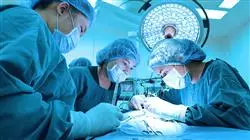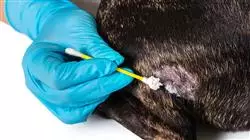University certificate
The world's largest faculty of veterinary medicine”
Description
Acquire the necessary skills to act as an expert in the area of Ophthalmologic Emergencies in Small Animals, with the mastery of the latest techniques and advances in this intervention”

In emergency medicine there is a series of understandings, procedures and techniques which are common in the majority of cases, independent of the specialty or specialties involved in each case.
Ophthalmologic emergencies usually command a great deal of respect from most veterinary clinicians because, although some emergencies are not life-threatening, poor management of the situation can have serious consequences in terms of loss of the patient's visual capacity or even loss of the eyeball.
In many cases, the emergency may be attended in the service itself, but in many other cases the patient will be stabilized and referred to a specialized center or service where, with the patient stable, they will be able to take charge of the case. Therefore, performing a correct triage and acting diligently in patients with ophthalmologic emergencies will substantially improve the prognosis of many patients.
This program in Management of Ophthalmologic Emergencies in Small Animals will address the care of a patient with an ophthalmologic emergency on arrival at the emergency department, initial stabilization, anamnesis, examination, complementary tests and medical treatment.
Get complete training in all aspects of Ophthalmic Emergency Medicine intervention through this highly effective educational program”
This postgraduate certificate in Management of Ophthalmologic Emergencies in Small Animals contains the most complete and up-to-date scientific program on the market. The most important features include:
- The latest technology in online teaching software
- Intensely visual teaching system, supported by graphic and schematic contents, easy to assimilate and understand
- Practical cases presented by practicing experts
- State-of-the-art interactive video systems
- Teaching supported by telepractice
- Continuous updating and recycling systems
- Autonomous learning: full compatibility with other occupations
- Practical exercises for self-assessment and learning verification
- Support groups and educational synergies: questions to the expert, debate and knowledge forums
- Communication with the teacher and individual reflection work
- Content that is accessible from any fixed or portable device with an Internet connection
- Supplementary documentation databases are permanently available, even after the program
A postgraduate certificate that will enable you to faced different situations with safety and therapeutic success”
The teaching staff includes teaching professionals who contribute their experience to this educational program, as well as renowned specialists belonging to leading societies and prestigious universities.
Thanks to its multimedia content developed with the latest educational technology, they will allow the professionals a situated and contextual learning, that is to say, a simulated environment that will provide an immersive learning programmed to prepare in real situations.
The design of this program is based on problem-based learning, by means of which the professionals must try to solve the different professional practice situations that arise throughout the course. For this purpose, the physicians will be assisted by an innovative interactive video system developed by renowned experts in the field of veterinary medicine who have extensive teaching experience.
With the experience of veterinarians specializing in the different branches of the small animal veterinary clinic"

A high intensity postgraduate certificate that will take you through different teaching approaches to allow you to learn in a dynamic and effective way"
Objectives
TECH's main goal for this postgraduate certificate in Management of Ophthalmologic Emergencies in Small Animals is to provide the professionals with substantial and updated information that compiles the most current knowledge based on the latest scientific research. Thus, the veterinarians will be able to acquire a series of competencies that will help them to catapult their career to success, becoming one of the best professionals in the sector.

Our goal is simple: to provide you with the knowledge and skills necessary to increase your competence in veterinary ophthalmic emergency care”
General Objectives
- Acquire knowledge and fundamental skills related to the initial patient care and the necessary diagnostic and therapeutic procedures used in the most common accident and emergency situations in the emergency department
- Identify the main emergency situations related to respiratory pathology
- Establish the fundamental knowledge and skills needed to care for patients with respiratory problems with the aim of improving the specific skills needed in this professional field
- Demonstrate the action procedures in emergency respiratory situations by mastering the available therapeutic procedures
- Establish the knowledge and skills that the veterinary professional needs to care for a patient with cardiovascular problems, with the aim of improving the specific skills needed in this professional field
- Analyze the main dermatological diseases in the field of Veterinary Science
- Develop the different dermatological treatments in Clinical Veterinary
- Develop the most advanced knowledge in ophthalmologic emergencies as a reference for the diagnosis and treatment of the most common ophthalmologic diseases in small animals
Gain a deeper understanding of the most advanced treatment and therapy in gastrointestinal emergencies in small animals - Establish the fundamental knowledge and skills needed to care for a patient with gastrointestinal problems, with the aim of improving the specific skills needed in this professional field
- Compile the knowledge and skills needed to care for a patient with hematologic and/ or oncologic emergency problems, with the aim of improving the specific skills needed in this professional field
- Offer the most appropriate treatments or therapies for patients with hematologic and/or oncologic emergency problems after performing correct anamnesis and the initial evaluation
- Establish the action protocol for patients in pain or with behavioral problems according to the latest scientific advances
- Gain a deeper understanding of the most appropriate medical-surgical techniques for patients with nephrological, urological and/or reproductive problems
- Offer the most up-to-date treatments for patients with metabolic and/or toxicologic problems according to the latest research in the field
Specific Objectives
- Perform the correct triage of patients who arrive at the emergency department
- Assess, manage and provide primary care to patients in the emergency
- Establish management guidelines to facilitate working with difficult patients (aggressive, fearful, etc.)
- Improve knowledge of anesthesia and analgesia in order to successfully perform a sedation, anesthesia and/or pain control procedure in critical patients
- Highlight the most common medication and treatments used in emergency medicine and their practical application
- Establish the diagnostic imaging tests and their practical application in emergency medicine in small animals
- Specify the characteristics and operation of an intensive care unit in small animal veterinary medicine
- Implement medical protocols in each critical situation to facilitate proper patient management
- Specify the patients which require specialized care in the intensive care unit
- Establish the management of nutritional therapy and metabolic support in patients in the Intensive Care Unit (ICU)
- Perform and interpret the routine tests in an emergency ophthalmology consultation, including the use of a direct and indirect ophthalmoscope, a slit lamp, a tonometer, Schirmer’s test, fluorescein test, etc.
- Establish diagnoses based on physical examination data and laboratory tests, specific tests and diagnostic imaging tests
- Use the most appropriate drugs and therapies in treating patients with emergency ophthalmologic problems
- Perform emergency anesthetic and surgical techniques on patients with loss of vision

A path to achieve education and professional growth that will propel you towards a greater level of competitiveness in the employment market”
Postgraduate Certificate in Management of Ophthalmological Emergencies in Small Animals
Due to the nature of its pathological processes and its frequent involvement in companion and production animals, ophthalmological emergencies currently account for a large part of the veterinary emergency care services. This situation has generated a growing demand for professionals specialized in this area of care. Understanding the academic update as an aspect of vital importance for an adequate occupational development in the sector, at TECH Global University we have designed our Postgraduate Certificate in Management of Ophthalmological Emergencies in Small Animals. In this postgraduate Postgraduate Certificate, the interpretation of ophthalmological test results and the identification of signs of ophthalmological emergencies will be addressed, this includes corneal ulcers, cataracts, glaucoma and retinal detachment. Likewise, the administration of ophthalmic treatments (drops, ointments) and the management of emergency ophthalmological surgical procedures will be studied in depth.
Study a Postgraduate Certificate 100% online
The pressing contexts that characterize the ophthalmological emergency care processes highlight this sector of veterinary medicine as one of the most demanding regarding the degree of knowledge and resolution capacity of its professionals. In our program, you will address the knowledge of the new scope and opportunities of the sector, contemplating the role of the veterinarian in the constant development of the area. In the same way, the parameters to perform a complete ophthalmological examination and manage the complications associated with the use of local and general anesthesia in ophthalmological procedures will be delved into. With this new baggage, you will be able to recognize and adequately treat these emergencies, providing early care that saves the animal's vision and avoids further complications in the future.







